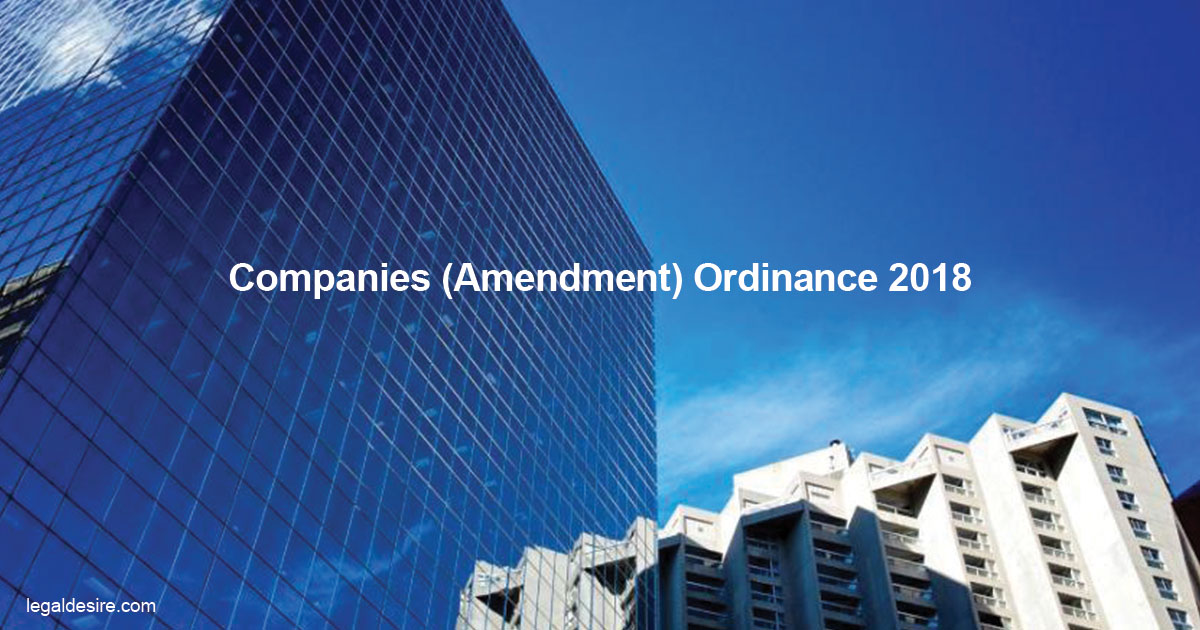Now Reading: Companies (Amendment) Ordinance 2018: Declogging the NCLT & a Step towards Decriminalisation.
-
01
Companies (Amendment) Ordinance 2018: Declogging the NCLT & a Step towards Decriminalisation.

Companies (Amendment) Ordinance 2018: Declogging the NCLT & a Step towards Decriminalisation.
The President of India promulgated an ordinance on 2nd Nov. 2018 to bring amendment into Companies Act, 2018, put forth by the Ministry of Law and Justice based on the recommendations of Committee headed by Mr Injeti Srinivas formed under the supervision of the Ministry of Company Affairs. This amendment has been brought into effect in lieu of the vacuums created by changes in the Companies Act 2013 (hereinafter ‘the Act’) vide Companies (Amendment) Act, 2017 and thus, bringing amendment in 31 Sections of the Act being enforced from the even date.
The purpose of this ordinance is to relook into the offences given under the Act and to bring insightful changes into the structure of the prosecution and the re-categorization of the offence as to de-burden the court from the offences which could be efficiently dealt with by the in-house adjudication because of the procedural and technical lapses involved in the court process. Besides, it is essentially dealing with the norms of Corporate Governance including the commencement of the business, maintenance of registered office etc.
This ordinance has been portrayed as exonerating the company from criminal liability by substituting the fine or imprisonment with the word ‘penalty.’ In Director of Enforcement Corporation v. MCTM[1], it was held that imposing of the civil penalty is for mere ‘blameworthy conduct’ but fine implies a guilty intention thus, requires a greater standard of proof. Thus, the burden of proof would be less on the regulator in determining the civil violations.
Salient Features of Companies (Amendment) Ordinance 2018
1. Re-Categorisation of Offences –
|
Provision |
Before Amendment |
After Amendment |
|
Section 53(3)- Prohibition on the issue of Shares at Discount |
A Company or any officer in default being liable with fine or imprisonment or with both |
A Company or any officer in default is liable to penalty. |
|
Section 64(2)- Failure to notify the alteration in the share capital |
A company or any officer in default or contravene being liable with fine. |
A company or any officer in default or contravenes being liable to penalty. |
|
Section 95(2) – Failure to file annual return with ROC within specified time. |
A company failed to file annual return shall be liable with fine. |
A company failed to file annual return shall be liable to penalty |
|
Section 102(5) – Failure to annex statement to notice of GM. |
A promoter, director, manager and KMP shall be liable with fine. |
Promoter, director manager and KMP shall be liable to penalty. |
|
Section 105(3)- Failure to give a declaration as to the appointment of Proxies |
Every officer of Company who is in default shall be liable with fine. |
Every officer of Company who is in default shall be liable to penalty. |
|
Section 117(2) Failure or Delay to file a resolution with the ROC |
The Company shall be liable with fine |
The company shall be liable to penalty. |
|
Section 121(3) – Failure or Delay in filing report of GM to the ROC. ( Public Listed Company) |
Company and officer in default shall be liable with fine. |
Company and officer in default shall be liable to penalty. |
|
Section 137 – Failure to file financial statements. |
The company, CFO, MD and other directors shall be liable to pay fine. |
Company, CFO, MD and other directors shall be liable to penalty. |
|
Section 140(3)- Failure to intimidate the ROC regarding resignation by the auditor. |
Such auditor liable with fine |
Such auditor liable to penalty. |
|
Section 157(2)- Failure to inform DIN to ROC |
Company and officer shall be liable with fine |
Company and officer shall be liable to penalty. |
|
Section 159- Default in relation to the appointment of director and furnish DIN in case of possession of 2 or more DIN. |
Director in default shall be liable with fine or with imprisonment. |
Director in default shall be liable with penalty. |
|
Section 165(6)- Accepting more than 20 Directorships |
Director in default shall be liable with fine. |
Director in default shall be liable with penalty. |
|
Section 191(5)- Contravention to the provision relating to payment to loss in office |
Director in default shall be liable with fine. |
Director in default shall be liable to penalty. |
|
Section 197(15)-Contravening provision relating to Managerial Remuneration |
The person in default shall be liable with fine. |
The person in default shall be liable to penalty. |
|
Section 203(5)- Contravening the provision relating to appointment of KMP |
Company, officer and KMP shall be liable with fine. |
Company, officer and KMP shall be liable to penalty. |
|
Section 238(3) –Contravening the provision regarding the registration of scheme involving the transfer of issues. |
Director in default shall be liable with fine |
Director in default shall be liable to penalty. |
2. Declogging the NCLT –
· Change in the definition of ‘Financial Year’ – Effectuating the power of Central Govt. in disposing of the application for the selection of the financial year. Amendment in the proviso of Section 2(42) stipulates that a company, whether it is a holding or subsidiary company or associate company or any company incorporated outside India, the Central Govt. on application from the company allows any period as its financial year, whether or not that period is a year. Initially, this power of selection of financial year was vested with NCLT, but to disencumber the NCLT from such process, the Central Govt. has been authorised to move it in that aspect.
· Power to Central Govt. in altering the Status – The power to change the company from Public to private company now has been vested with Central Govt. instead of NCLT by amending Section 14 of the Act. However, the pending applications before the date of commencement of Ordinance would be disposed of by NCLT. Initially, this power was vested with Central Govt. under the 1956 act, but the same was transferred to NCLT. But considering the speedy disposal for conversion application, the same power has been given to Central Govt. now, who may delegate such power to ROC or RDs, even NCLT in certain classes of companies.[2]
· Extending pecuniary jurisdiction of RD – Considering the bulk of cases falling into the domain of NCLT, the pecuniary jurisdiction for compounding the offence of RDs has been increased from Rs. 5 lakhs to Rs. 25 Lakhs.
3. Improving Corporate Governance
· Commencement of Business – (Insertion of Section 10A) – A company commencing its business or exercising its borrowing power must:
a) Director to file a declaration within 180 days with ROC as to every subscriber to MOA has paid the value of Shares. Penal provisions are 50000 Rs for Company and 1000 Rs each day for an individual extending up to 1 Lakh.
b) The Company has verified its registered office in e-form INC 22.[3] (Addition of New Section 10A).
This provision has been restored which was omitted by the Companies (Amendment) Act, 2015 which will hugely assist in the early identification of inactive companies and thus, ROC does not have to wait for 2 years under Section 248.
· Verification of Registered Office – 1) Physical verification of registered office can be done on the reasonable cause to believe that no business operation is going on. 2) The Registrar may remove the name of the Company in case of default found. (Section 12 read with Section 248 – Addition of new clauses). This provision is included in order to do away with ‘the paper companies’ because in reality, owing to large enquiries and inspection, the companies are not maintaining the registered office.
· Register of Significant beneficial Owner in Company- Considering the importance of disclosure in Corporate regime, in case a person ( beneficial owner) has failed to disclose in the interest in the company, he shall be liable with imprisonment for term which may extend to one year or with fine to the extent of 10 Lakh rupees or with both. [Section 90(10)]. Also, empowers the company to file an application before NCLT for determining the number of shares of the beneficial owner if the company has a reasonable basis regarding the person possessing significant ownership. (Section 90(1)).
· Disqualification of Director ( Section 164 (1) (i) r/w Section 167(1)) – If the director is not complying with the number of directorships stipulated under Section 164(1) of the act i.e. 10 in case of Public Company and max 20 directorship, the director shall be subjected to disqualification.
4. Amendments in the adjudication of Penalties.
· Adjudication of Penalties (Section 454(3)) – Now, adjudicating officer may impose the penalty on ‘any other person’ signifying the wide powers of an adjudicating officer and can also direct the person to make good the default. Also, the amendment in Clause 8 of Section 454 by removing the penalty imposed by the adjudication officer, thus increasing the scope of the penalty that can be levied.
5. Increasing Punishment for Fraud and insertion of repeated defaults.
· In Section 447 of the Act, the maximum punishment for the fraud has been increased to 50 Lakhs from 20 lakhs where the fraud involved the amount of 10 Lakhs or 1 % of the turnover whichever is lower.
· Insertion of Section 454A – Double penalty to be imposed in case of repeated default within three years.
Conclusion
This ordinance has brought significant liberalisation in the economic and company related offences and on the same page, has improved the corporate efficiency by improving the corporate governance norms like Commencement of the business etc. The report has been more or less been adopted by the Ministry of Law and Justice. Turning the phase of corporate criminalization would trigger the ease of doing business in India, thus soliciting Corporate Autonomy.
[1] AIR 1991 SC 1100 (India).
[2] Ministry of Corporate Affairs, Govt. of India, Report of the Committee to review the offences under Companies Act 2013 (Aug. 2018), (Last Visited Nov. 22, 2018), http://www.mca.gov.in/Ministry/pdf/ReportCommittee_28082018.pdf.
[3] Smirit Wadehara & Megha Saraf, Companies (Amendment) Ordinance, 2018, [2018] 99 taxmann.com 324.







